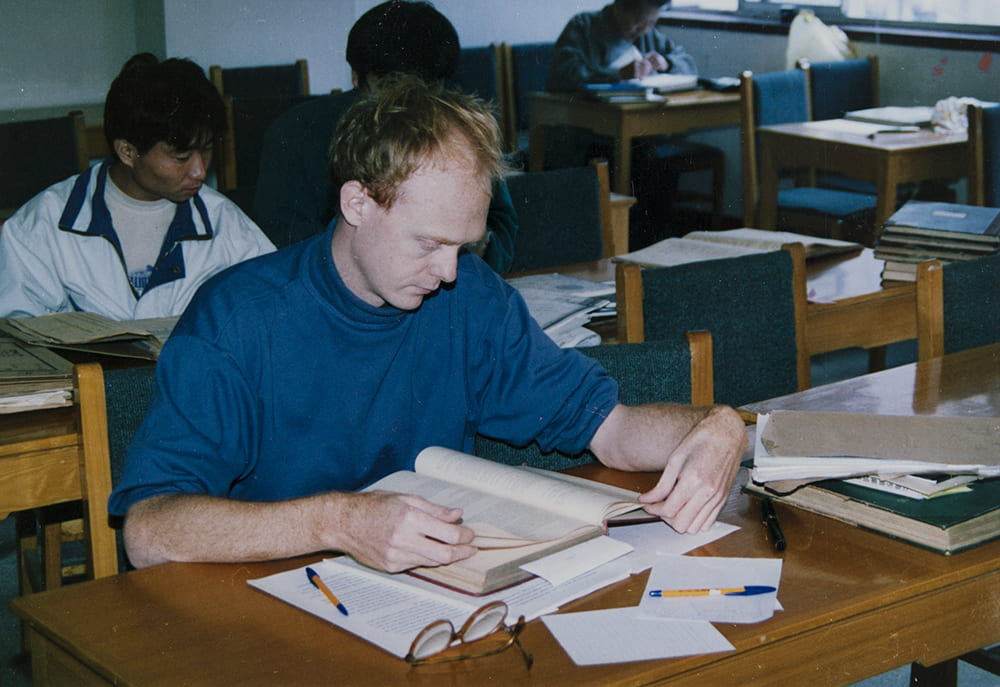Robert Bickers is Professor of History and also the University’s Associate Pro Vice-Chancellor for Postgraduate Research. As well as supervising nine PhD students with colleagues in the Department, he coordinates the University’s work with all its research postgraduates. He works on the history of modern China, and within that specifically how this intersects with the wider history of colonialism and imperial power.

Early visit to a Chinese archive: Shanghai 1994.
Hi Robert! Thanks for joining us. Could you tell us the title of the new book?
China Bound: John Swire & Sons and its World, 1816-1980 has just been published.
What’s the book about?
John Swire & Sons is a British-based conglomerate that has a substantial presence in East Asia, and especially in Hong Kong. It’s 150 years since it opened a branch in what was then a British colony, having established itself in Shanghai in 1866. It’s probably best known today as the owner of the airline Cathay Pacific. I use the story of the firm’s development from its roots as a one-man import-export business based in Liverpool as a different focus for a history of the globalization, modern China, and the rise and decline of British empire and British power.
I’m primarily interested in the people involved, whether they were from Liverpool or Guangzhou, Bristol or Shanghai, and whether they were its owners, Cantonese crewmen on its ships, dockyard staff at Hong Kong, or the passengers on its ships or aircraft.
How did you become interested in this topic?
I was commissioned to write this by the firm, and given a free hand in how I did so.
John Swire & Sons is a family-owned enterprise, and this has encouraged a strong interest at the top of the company in its own long history. The original John Swire first appears in any records in Liverpool in 1816. One challenge in writing the book is that I had five John Swires to deal with across the period.
You can imagine my relief when I got to its Chairman in the 1930s, Warren.
What is the importance of Swire today?
Really? Have you read the news recently? But put it another way: whenever I ask an audience what they learned about China at school the answer is almost always nothing. And that’s not just ‘nothing about Chinese history’, that’s nothing about China.
But the British presence in China was the most visible and most disruptive the country suffered over most of the century before the Japanese invasion began in 1931. All schoolchildren in China know the outline of this story, and they know much of the detail too.
What advice would you give to a student interested in doing this kind of work?
Challenge yourself; dive in!
I can’t say I knew much about maritime history, the history of commercial aviation, or sugar refining, before I began working on the book.
What’s the best advice you ever got about history?
Well, I learned from marginal comments on my undergraduate essays by my UCL tutors Conrad Russell and John Hale not to mistake rhetorical flourish for argument.
The advice I give, though: read, read, read, read, read, read, read.
And read anything and everything.
What’s the most interesting thing you’ve read in the last twelve months?
My reading highlights in the last year have included reading through all six volumes of Virginia Woolf’s letters, and most of John Le Carré. Much to learn from both about writing, structure, their times.
If you had a time machine, where and when would you most want to go?
I’d like to travel out 1st class to Hong Kong on a P&O steamer, say in about 1851.
In June that year I might have caught the Ganges, stopping at Gibraltar, Malta, and Alexandria, changing to travel overland then along the Nile to Cairo and on to Suez by carriage (the canal would not open until 1869), there taking another steamer stopping at Aden, Galle, Penang, and Singapore before arriving in Hong Kong seven weeks later.
Who wouldn’t want to do that?
What’s your must-do Bristol activity?
Eat a Pitta, Chilli Daddy, Swoon;
Bosco Pizza;
Pieminister.
…which actually makes a really unimpressive haiku. This is why I am a historian and not a poet.
What are you working on next?
Returning to an incident that took place in south China in 1932, digging into which led me back and forward in time, and across the globe. It all began when I spotted the words ‘abduction’ and ‘lighthouse’ in a file title in a catalogue back in, er, 2004. These things sometimes take time.
